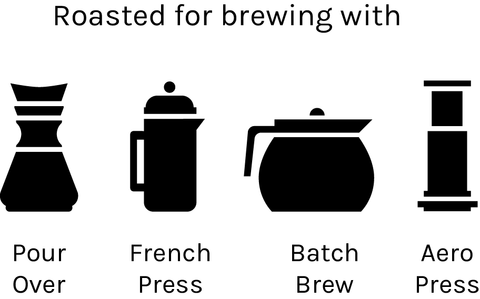Kimbo Estate, Kenya - Filter Roast
Strawberry, Lemonade, Blackcurrant
$26.00
This variant is currently sold out
Kimbo is a small, eight-hectare estate located in Embu County, owned and managed by Lucy Wanjiru and her son Christopher Munene Njiraini. The farm sits at 1,600 meters above sea level in the foothills of the extinct volcano, Mt Kenya, close to the town of Kerugoya. The area is defined by its bright red, nutrient-rich, volcanic soil and cool climate, both of which contribute to the outstanding quality of the coffees produced on this farm.
The estate was initially purchased by Lucy’s father-in-law, Mr. Kimbo, in the 1960s. Lucy’s late husband eventually inherited the land, and decided to expand it in size by purchasing other nearby farms. Lucy took over operations after his passing, sharing duties with her son Christopher who is also a medical doctor.
At the time of planting, Mr. Kimbo chose the SL-28 variety that is commonly found in central Kenya, specifically because it produces a high-quality flavour profile. With time, the estate was also planted with a small amount of Ruiru 11 and Batian, two hardier, hybrids that are very popular among farmers for their high yields and disease resistance, and potential for high quality in the cup. The varieties are harvested and processed together, as separation is challenging to achieve during the busy harvest period.
In 2011, Lucy and her husband built a small wet mill – or factory, as they are called in Kenya – on their land. This facility enabled the couple to process and dry their crop onsite, rather than selling fresh, whole cherry to the local Farmers’ Society Cooperative. By processing her coffee independently, Lucy is able to control every step of production directly – from farming, to harvesting, processing, drying and sale – ensuring the full potential of the crop is achieved in terms of quality and sale price. The resulting coffee lot reflects the incredible amount of hard work and attention to managing every single variable that influences quality.
HOW THIS LOT WAS PROCESSED
The coffee was carefully handpicked by Lucy, Christopher and the rest of their family, along with any seasonal workers required. During the peak of the harvest, cherries are carefully picked, to ensure only the ripest are selected. After sorting, cherry was pulped using a pulping machine, which removes the skin and fruit from the inner parchment layer that protects the green coffee bean.
The coffee was then dry fermented for 12-24 hours, to break down the sugars and remove the mucilage (sticky fruit covering) from the outside of the beans. Whilst the coffee was fermenting it was checked frequently, and when ready it was rinsed and removed from the tanks.
Using clean water from nearby rivers, the parchment-covered coffee was then washed and graded in water channels, before being transferred to raised drying tables. During the drying stage, which takes up to three weeks, the drying parchment was turned constantly to ensure it is dried evenly, until it reached 11–12% humidity. Once ready, coffee transported to the Embu County Mill to be dry milled and prepared for shipping.




















